General Sewer Plan
An aging sewer system poses the question: how do we prioritize investments in the next 20 years?
Watch the City's video about the Sewer System, its history, key issues, and financial considerations on our YouTube channel.
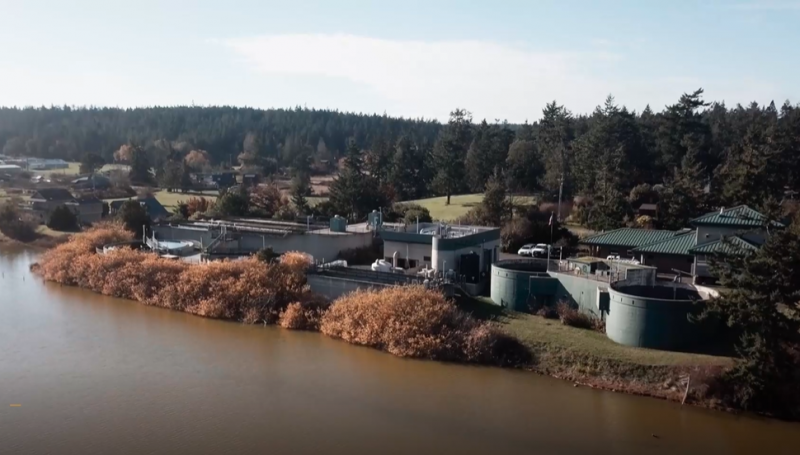
Background Information and Key Issues:
The City’s wastewater system is comprised of three critical components. Wastewater is first collected through a network of pipes that all flow to the wastewater treatment plant. The wastewater treatment plant applies a combination of mechanical and biological processes to raw sewage to reclaim the water before it is discharged to the Strait of Juan de Fuca. This treatment process removes the solids from the water which is then composted with yard waste at the City’s compost facility.
1. Collection System
The collection system includes approximately 80 miles of pipe along with 7 lift stations. The collection system routes raw sewage from buildings in the City to the wastewater treatment plant located on Kuhn Street. Much of the collection system is old and suffers from root intrusion. Additionally, stormwater from the roof drains in downtown and some city streets flow directly into the collection system. The collection system needs investment to sustain its viability in delivering raw sewage to the wastewater treatment plant.
2. Wastewater Treatment Plant
The City’s wastewater treatment plant is an incredible biological facility, cleaning approximately 900,000 gallons of sewage per day to meet Department of Ecology water quality standards prior to being discharged to the Strait of Juan de Fuca. The City’s wastewater treatment plant is nearly 30 years old and needs refurbishment. For example, the outfall pipe takes treated discharge water around 800 feet offshore at North Beach. This pipe is in disrepair and needs rehabilitation and the City is currently working with the Department of Ecology to analyze options to best address this challenge. Every five years, the City is required to obtain an update to the National Pollutant Discharge Elimination System (NPDES) Permit issued by the Washington State Department of Ecology. A new discharge permit is anticipated in 2023. As of January of 2022, the City is also now operating under a new permit issued by the Department of Ecology called the Puget Sound Nutrient General Permit. The purpose of this permit is to reduce the amount of nutrients entering Puget Sound from all wastewater treatment plants discharging directly to the Salish Sea. The City of Port Townsend’s wastewater treatment plant already does an excellent job of removing nutrients prior to discharge in the Strait of Juan de Fuca. As the City grows, upgrades to the wastewater treatment plant will be required to ensure effective nutrient removal continues as the plant gets closer to reaching its design capacity.
3. Compost Facility
The City’s compost facility uses the biosolids that remain after treatment at the wastewater treatment plant in combination with yard waste from the City and Jefferson County to create a high-quality Class A compost. The process typically involves 2-4 months of composting and testing before the finished compost can be sold to the public. This compost is then returned back to the land enriching the soils with nutrients. The compost facility works in concert with the wastewater treatment plant.
For more background information on the City’s wastewater system and its history, watch the City's video about the Sewer System, available on our YouTube channel. The Port Townsend Library has provided programs on How Your City Works, including two presentations by the City’s Wastewater Treatment/Compost Facility Operations Manager, Bliss Morris. View the video recordings of his presentations.
Looking forward, questions around population growth, system capacity, sea-level rise, and aging infrastructure throughout the City warrant review and prioritization of investments of ratepayer dollars. An updated General Sewer Plan will provide a comprehensive look at the utility and prioritize investments for the future to ensure compliance with the NPDES permit and Department of Ecology regulations. The City has engaged RH2 Engineering to assist in the evaluation of the entire sewer system including the collection system, wastewater treatment plant, and the compost facility. You can watch recordings of meetings with City Council below, and view presentations from staff and RH2 about the system and long-range rate models the City is exploring.
We want to hear from you and what you desire from your sewer utility.
Objectives/Desired Outcome(s):
Adopt a General Sewer Plan, obtain a renewed NDPES permit, and solve the outfall problem. A key component of the General Sewer Plan is the development of the Capital Improvement Plan which will likely cause an increase in the sewer utility rates. Achieving these outcomes with public support and funding is the primary objective of this initiative.
The photos below are:
- The Gaines Street Lift Station pumps sewage from Uptown and Downtown to Kuhn Street.
- Our Lead Operator of the Wastewater Treatment Plant monitoring clarifier operations.
- The compost facility: We also receive septage from the maintenance of septic tanks primarily located in Jefferson County.
- Map of where the Wastewater Treatment plant is located, and the Outfall pipe: The outfall project seeks to rehabilitate or replace the pipe that discharges reclaimed water to the Strait of Juan de Fuca.
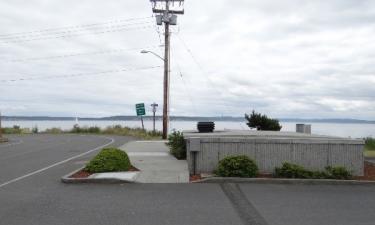
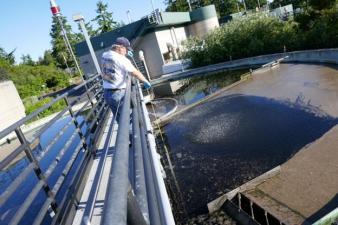
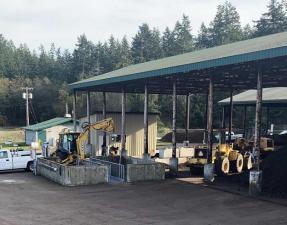
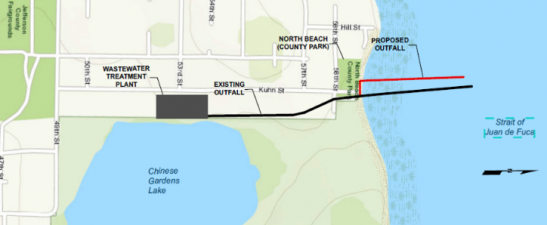
Fiscal Considerations:
Nearly 4,800 sewer customer accounts generate over $3.5 million of revenue annually. The City Council adopted new sewer rates that will increase significantly over the next 5 years to address capital investments necessary to maintain the sewer system and address growth over the next 20 years. Details about the rates are available here.
Materials available for review:
Video and meeting materials for past meetings are available. In most cases presentation materials are linked within the Agendas.
- February 20, 2024: City Council Business Meeting | Agenda | Meeting Video
- February 12, 2024: City Council Workshop Meeting: Sewer Rates Workshop | Agenda | Meeting Video
- February 5, 2024: City Council Business Meeting | Agenda | Meeting Video
- January 8, 2024: City Council Workshop Meeting | Agenda | Meeting Video
- January 3, 2024: Infrastructure and Development Committee | Agenda | Meeting Video
- August 14, 2023: City Council Workshop | Agenda | Meeting Video | Presentation
- June 7, 2022: How Your City Works – Giving Back to the Land
- May 8, 2022: City Council Workshop Meeting | Agenda | Meeting Video
- May 3, 2022: How Your City Works - What Happens After You Flush | Agenda
- December 14, 2020: Council Workshop Meeting | Meeting Video | Presentation
Estimated Schedule:
- April 2024: New sewer rates go into effect
- February 2024: Council decisions on rates
- December 2023 - January 2024: Complete General Sewer Plan and perform rate analysis
- Summer 2023: Develop nutrient removal strategies
- Spring 2023: Develop Capital Improvement Plan
- Fall 2022: Develop a preliminary draft of the General Sewer Plan
- Spring 2022: Public outreach
- Fall 2021: Start General Sewer Plan Update with Analysis
Contact Information:
Bliss Morris | Wastewater Treatment Operations Manager | bmorris@cityofpt.us | (360) 385-3000 x 3197
Steve King | Public Works Director | sking@cityofpt.us | (360) 379-5090
